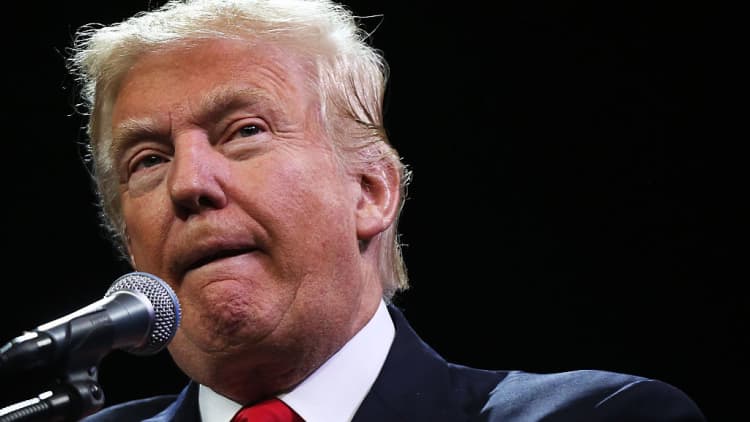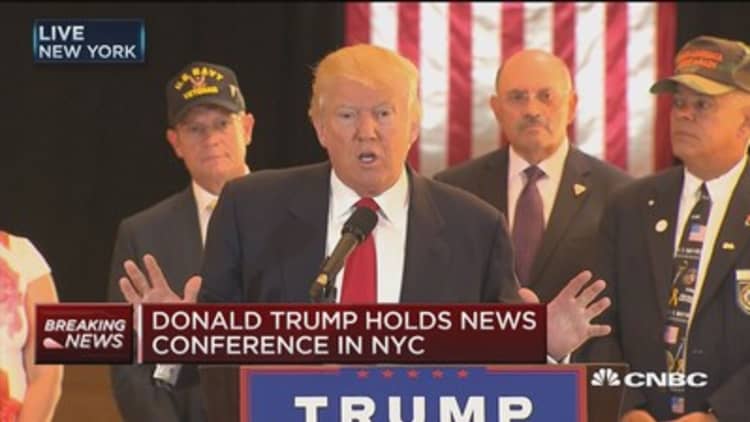
Just as Donald Trump is starting to make up ground in polls against Hillary Clinton, he faces a new problem: third parties.
Over the holiday weekend, the threat advanced on two fronts. First, the Libertarian Convention in Orlando, which nominated a relatively experienced ticket of two former Republican governors: Gary Johnson of New Mexico and Bill Weld of Massachusetts as his running mate.
Second, Weekly Standard editor and "Never Trump" activist Bill Kristol hinted on Twitter that his efforts to draft a third party conservative candidate to rival Trump may have finally bore fruit. The payoff turned out to be a less than well-known name, however, in David French, a decorated Iraq veteran and staff writer at National Review.
Here's what we know (and what we don't know) about the environment for an outside candidate.
Who's running?
We don't entirely know. On Tuesday, Bloomberg News broke the story that obscure author and commentator David French was exploring a run with Kristol's encouragement. Several sources confirmed to NBC News French's interest, but it's not clear whether a bigger name might take the plunge instead.

Sources within the informal, loosely organized Never Trump movement say they've approached a number of possible candidates only to be shot down. Activists are still holding out hope about the remaining "irons in the fire," one source told NBC News.
"Every day is crucial and so that's why we're trying to get something done fast enough, and it's quite obvious that some of the top targets of candidates ended up saying no," the source continued.
The goal is to find a balanced ticket that has something to offer social conservatives, hawks, and economic conservatives who feel alienated by the Republican nominee.
The most oft-mentioned picks are 2012 GOP nominee Mitt Romney, freshman Senator Ben Sasse of Nebraska, former Senator Tom Coburn of Oklahoma and retired Marine Corps General James Mattis, among others. All of the above figures have so far rejected the idea, however, and an aide to Romney reiterated to NBC News Tuesday that the ex-governor was still "not running."

The newly-minted Libertarian ticket could serve as a fallback. On Tuesday, The Wall Street Journal editorial page described Johnson and Weld as an "honorable alternative" to Trump and Clinton should voters find themselves disenchanted with both. But Johnson and Weld have problems of their own on the right: they're relatively pro-choice, support same-sex marriage and back legalizing marijuana. If you're a social conservative opposed to Trump because you think he's a closet liberal with two wives too many, they may not be your ideal protest vote.
Can a third party win?
It's extremely unlikely. The country is highly polarized along party lines and polls already show Trump and Clinton largely consolidating their side's respective voters, with Clinton hampered a bit by her ongoing race against Bernie Sanders. As much as Trump winning the nomination scrambled political expectations, a hastily organized third-party effort seriously competing in November would be a vastly bigger surprise. Advocates of a third-party run argue that Trump's and Clinton's unpopularity give them an opening to at least achieve new relevance compared to past outsider candidates.
What's the point of running then?
A third party would give conservatives ideologically opposed to Trump a megaphone to carry on their message in exile. There's also a strategic argument: Never Trump leaders assume the presumptive GOP nominee is on track for a devastating defeat and worry that disgruntled conservatives won't show up to the polls to support Republican candidates down ballot. Democrats have a strong chance of winning back the Senate thanks to a favorable map, and many of the most important races are in swing states including Florida, Ohio, Pennsylvania and New Hampshire. The House is a much tougher climb, but not impossible in a blowout situation. Republicans have made tremendous gains at the state level under President Obama, and there are concerns Trump could reverse their progress there as well.
More from NBCNews :
Car drives over motorcycle inroadrage incident
Clinton to Shirtless Supporters: Please Don't Take Anything Else Off
Adele stops her performance to admonish filming fan
For the Libertarian Party, the goal is to spread the limited government gospel and hopefully get on the debate stage, which would require them to reach 15 percent in polls. If they finish with 5 percent of the vote they can qualify for federal funding, which would give them a chance to build on their progress in 2020.
Can they even get on the ballot?
Here's where the Libertarians have the advantage: They're already on the ballot in 32 states and say they're on track for all 50 and the District of Columbia.
For a conservative candidate, it won't be easy to get on fifty state's ballots a mere five months before the election, especially if they have little name recognition, experience and infrastructure. Different states have different deadlines and requirements, but our Never Trump source said the groups mobilizing against Trump have a plan to get themselves on at least 39 state's ballots, and might even go to court to fight some of the tougher restrictions that would keep them off the ballots in states like Texas, where Independent candidates were required to signal their interest in running last year.
There's still some hope, though. Richard Winger, editor of Ballot Access News, noted to NBC News that past candidates have successfully sued to bypass onerous ballot requirements, and Never Trump supporters are looking at possible legal challenges should they draft a candidate. All of these efforts would take resources and organization, however, and it's not clear how much funding and grassroots support there is waiting in the wings.
Should Donald Trump be worried?
He sounds worried. While Trump usually is known for bragging about his non-stop winning ways, he's warned Republicans flirting with a third-party bid that they'll hand Clinton the White House if they actually go through with it.
"What you're going to do is you lose the election for the Republicans and therefore you lose the Supreme Court," Trump said at a press conference Tuesday.
Nonetheless, he predicted their recruitment efforts wouldn't succeed and called Kristol a "loser." Kristol, in turn, tweeted that Trump was a "roaring jackass." Just another day in the 2016 election.
Election forecaster Stuart Rothenberg told NBC News he has a dim view of Trump's chances against Clinton, but predicted the divisive GOP primary left room for a third-party challenger to emerge on the right.
"Trump is likely lose a head-to-head race against Clinton," he said. "A three-way with a very serious candidate running as thoughtful conservative Independent would make it that much more difficult for Trump."
Trump could be more vulnerable in some states than others. He performed abysmally in some Western states like Utah, where he proved especially unpopular with Mormon voters, raising the possibility a spoiler candidate could flip the state to Democrats and give them an even greater electoral cushion. Two polls of Utah voters in March showed Trump and Clinton statistically tied, but a more recent Utah Policy/Dan Jones survey in May gave Trump a 13-point lead.
"He had problems with the LDS vote, but at the end of the day he's going to win the state," Chuck Warren, a Utah Republican strategist, told NBC News. The primary factor was the state's antipathy toward the Clinton brand: He noted that Bill Clinton finished third in the state in 1992, behind both Ross Perot and George H.W. Bush.
National polls also suggest Trump is unifying Republicans relatively quickly, and he's faced less opposition than many expected from establishment leaders since wrapping up the nomination. That may explain Kristol's difficulty finding a well-known name to run third party.
Polls are just starting to include Johnson, but some that do indicate he could be a legitimate factor. A Fox News poll last week put his support at 10 percent, but it gave Trump a narrow 42-39 lead over Clinton, suggesting he was pulling support from Clinton as well while she tries to bring Sanders supporters home.
Even if Johnson can't rise to the level of being a credible threat, Trump will face another critic — on or off the debate stage - and one who will come at him both morally and as a small-government advocate. "When Donald Trump talks about deporting 11 million illegal immigrants, that's just wrong," Johnson roared this weekend at his party's convention.
Trump has also attacked Libertarian vice presidential nominee William Weld, suggesting to The New York Times that the former Massachusetts governor is an alcoholic. Weld demurred when asked for comment this weekend, saying "I'll let that ride."


